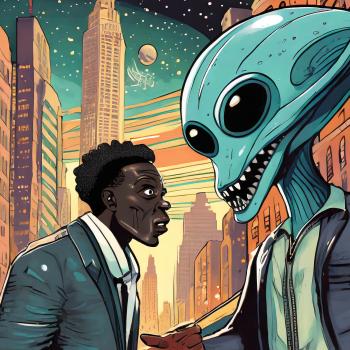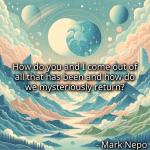
I do reviews of all the books I read in another venue. As this was a religious book, and a particularly misguided one at that. I thought it was worth posting a modified review of it here as well.
The New Copernicans: Millennials and the Survival of the Church
By: David John Seel Jr.
Published: 2018
224 Pages
Briefly, what is this book about?
Christianity is in crisis, and only one thing can save it: the New Copernicans! Who are the New Copernicans? Millennials! What makes them New Copernicans? Great question! Through a process Seel never bothers to explain, millennials have been granted the super power of right-brained thinking! This will allow them to sweep aside the sclerotic remnants of left-brained evangelical dogma and usher in the Age of Aquarius. (He doesn’t actually use this term, but he might as well because the exact same claims were being made by the counterculture movement about youth in the late 60s.)
Right-brained? Left-brained? Is that still a thing?
Iain McGilchrist, an author, psychiatrist, and former neuroimaging researcher at Johns Hopkins has been at the forefront of clarifying actual differences between how the right and left hemispheres of the brain operate. This began in his book The Master and His Emissary: The Divided Brain and the Making of the Western World, and continues in his two volume work The Matter With Things: Our Brains, Our Delusions, and the Unmaking of the World. McGilchrist’s contention is that since the scientific revolution we have sought to understand the world by breaking it down into pieces. This has been enormously effective on many fronts, but it has also led to a diminishment of the right hemisphere and a prioritization of the left hemisphere. The right hemisphere used to be the “master” while the left was merely the “emissary”. The aforementioned diminishment and prioritization has inverted this relationship which has led to numerous problems.
Seel mentions McGilchrist and his work repeatedly. Seel claims that millennials are the first generation since the Enlightenment to give precedence to right-brained thinking. McGilchrist says that right hemisphere thinking is good, ergo millennials are the New Copernicans. This would be a stretch even if Seel was representing McGilchrist accurately, but he’s not. I’ve read The Master and His Emissary, and I’m 800 pages into The Matter with Things and nowhere does McGilchrist say that millennials are unusually good at using their right hemisphere. If anything, McGilchrist argues the exact opposite, that left-hemisphere dysfunction just keeps getting worse, and the younger someone is, the worse their dysfunction.
What’s the author’s angle?
Seel is a self-described “cultural-renewal entrepreneur and social-impact consultant with expertise in the dynamics of cultural change”. Given his title, it’s entirely possible (in fact, highly likely) he wrote this book because he’s trying to sell you something. His overly buzzword-filled title at least sounds better than my initial assumption: he’s an idiot
Who should read this book?
No one! This book is so bad I have decided to crown it “the worst book I have ever read”.
I’m pretty broad-minded when it comes to the books I enjoy. Goodreads says I’ve read 1124 books since I started tracking things in 2011. 1100 of those I’ve given 3 stars or higher (my sister, who also tracks her reading on Goodreads, claims that I’m way too nice.) I’ve given 23 books two stars and they all stick out in my memory. This book is the first time I have given only one star. What did it do to deserve this unique fate? Keep reading.
General Thoughts
Where to start? This book was recommended to me. I won’t tell you by whom, lest it besmirch a wise—if somewhat guileless—individual and his great organization. The person who recommended it to me, did so because he had decided to make it the inaugural selection for his book club. In his defense, he hadn’t read it either. Nevertheless it was recommended to him, so somewhere out there are people who like it. If you don’t think too deeply about it, there’s some chance Seel has a point. However, to the extent that he does, it’s not a novel one. And to the extent that it’s novel, it’s incoherent.
Let’s start with the point he might have. Young people are leaving religions at an alarming rate. At the book’s most basic level, Seel opines that perhaps they wouldn’t leave if we paid more attention to their opinions. As I said, this is far from novel and beyond that, there’s evidence that it doesn’t work. Liberal denominations have shrunk over the last decade while more conservative denominations have grown. Still, you could imagine that it might work; if Seel’s book stuck to that premise, it would be boring but unobjectionable.
Unfortunately, Seel goes much farther. It’s one thing to say we should listen to millennials, it’s quite another to grant them quasi-mystical powers, which is what he’s doing by assigning them the label of New Copernicans. For those who need a refresher, Nicolaus Copernicus was the scientist who put forth the first coherent model placing the Sun at the center of things rather than the Earth. This was a massive reframing of the way the universe worked. Seel contends that millennials are poised to bring about a similar reframing with respect to Christianity, and religion more broadly.
The millennials do this by being the first generation to have shaken off the shackles of left-brained thinking which has chained down society ever since the Enlightenment. They are the first right-brained generation and, if we step back and allow them to work their magic, they will completely revolutionize religion.
There are numerous problems with this contention. Here’s a brief, but by no means exhaustive list:
- The book contains next to no supporting data. There were lots of statistics about how many millennials are leaving organized religion, but very little in support of his actual thesis. Really about the only thing I could find was this line: “Seventy-eight percent of millennials prefer experiences to things. Eighty percent said experiences help shape their identity.” These are the only numbers given and they border on being meaningless. It might be possible to overlook this except…
- The book is completely devoid of anecdotes. Just some examples of actual millennials actually doing the sorts of things Seel talks about would have helped out enormously.
- Seel was very specific about millennials. He wasn’t talking about young people in general, he was talking about people born between 1980 and 2000. This book was published in 2018, what about Gen Z? Why exactly did just millennials end up being so special and no one else.
- Seel’s misrepresentation of McGilchrist is so egregious that it got its own section, but not only does he misrepresent McGilchrist, every time Seel quoted an author I was familiar with, he distorted what they actually said.
- To the extent Seel does sketch out a revitalized religion it bears only a slight resemblance to Christianity. Seel offers up Burning Man as the ultimate example of a New Copernican movement. Burning Man is a movement and there is an air of spirituality to it, but it’s definitely not pro-christian. To be fair it’s not explicitly anti-christian either, but at best it’s orthogonal to Christianity, and to expect it or something similar to revitalize Christianity seems delusional.
Conclusion
Yes, churches of all stripes have a problem keeping younger people engaged and active. We can agree on this. The problem with Seel’s solution is that it’s too simplistic. If this problem could be solved by just turning the keys over to millennials and letting them run with things someone would have already done it. If there is evidence of this happening, Seel really should have prioritized talking about those people rather than all the other things he chose to speak about. I suspect he didn’t because it’s not happening. The problem is significantly more complicated and solutions, if they exist, are going to be similarly difficult to find and implement.
I agree: churches need to do better at engaging with young people in general. But treating them as semi-divine beings takes things in exactly the wrong direction. No one is born magical. We’re all born broken, and when we join as a community to deal with that brokenness that’s when magical things happen.












